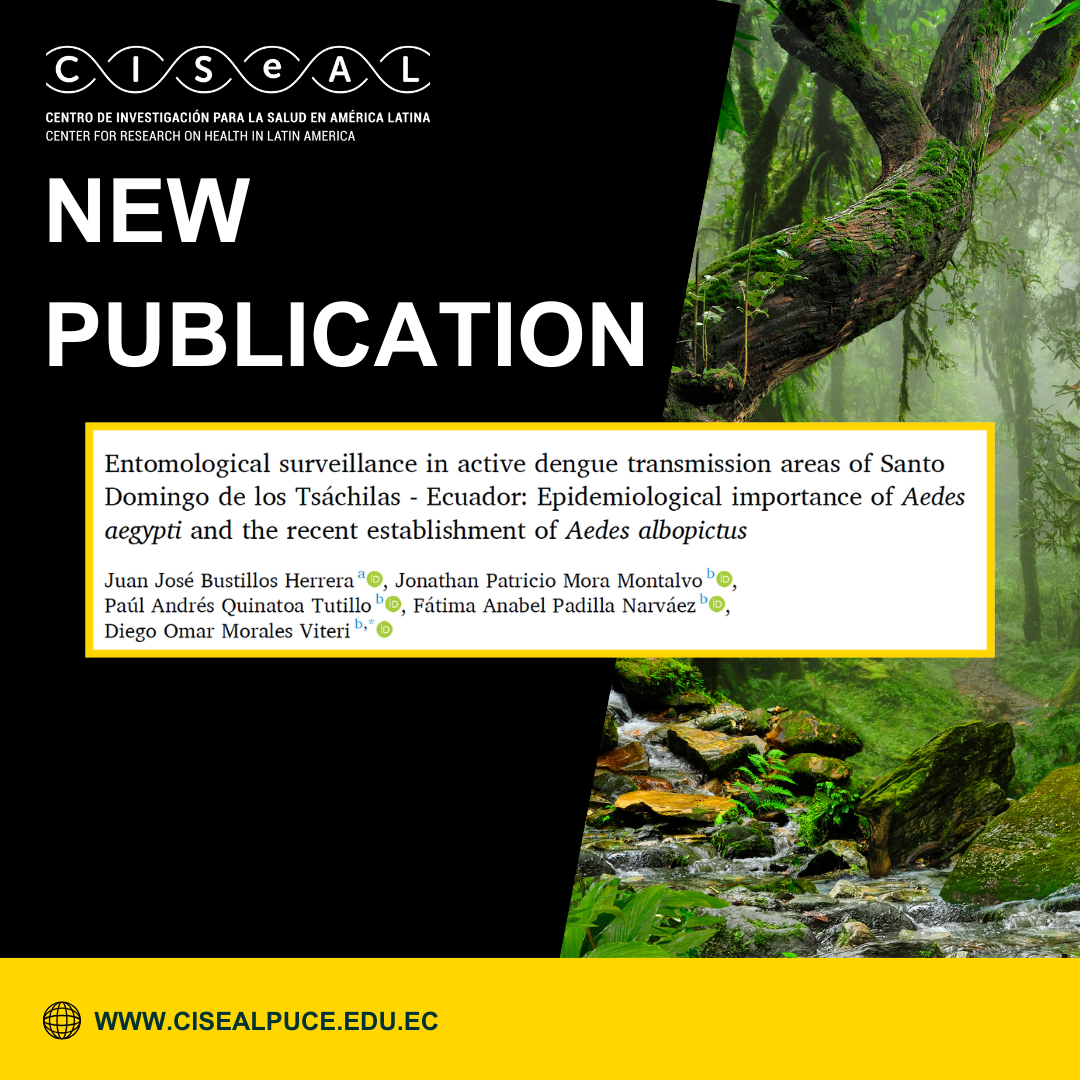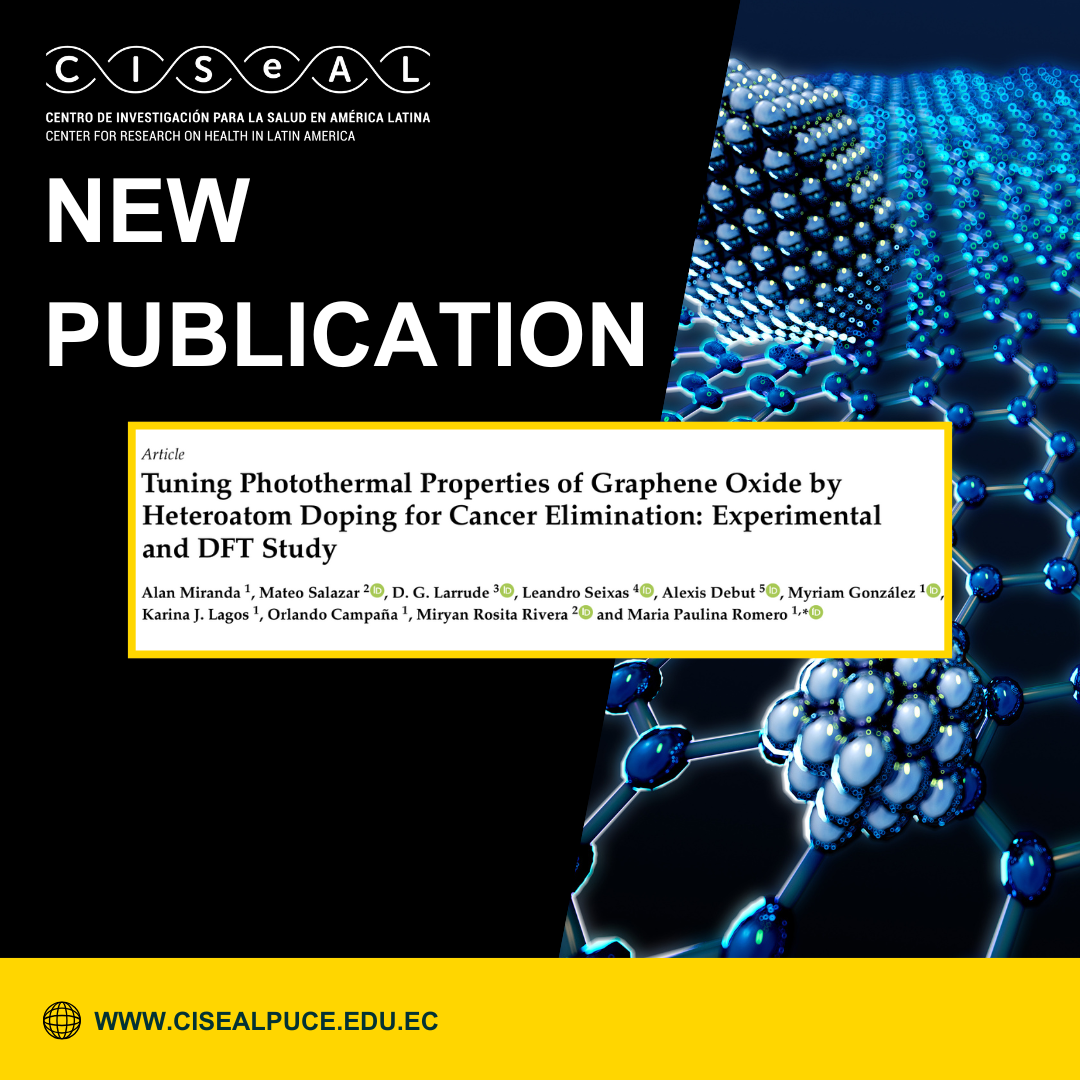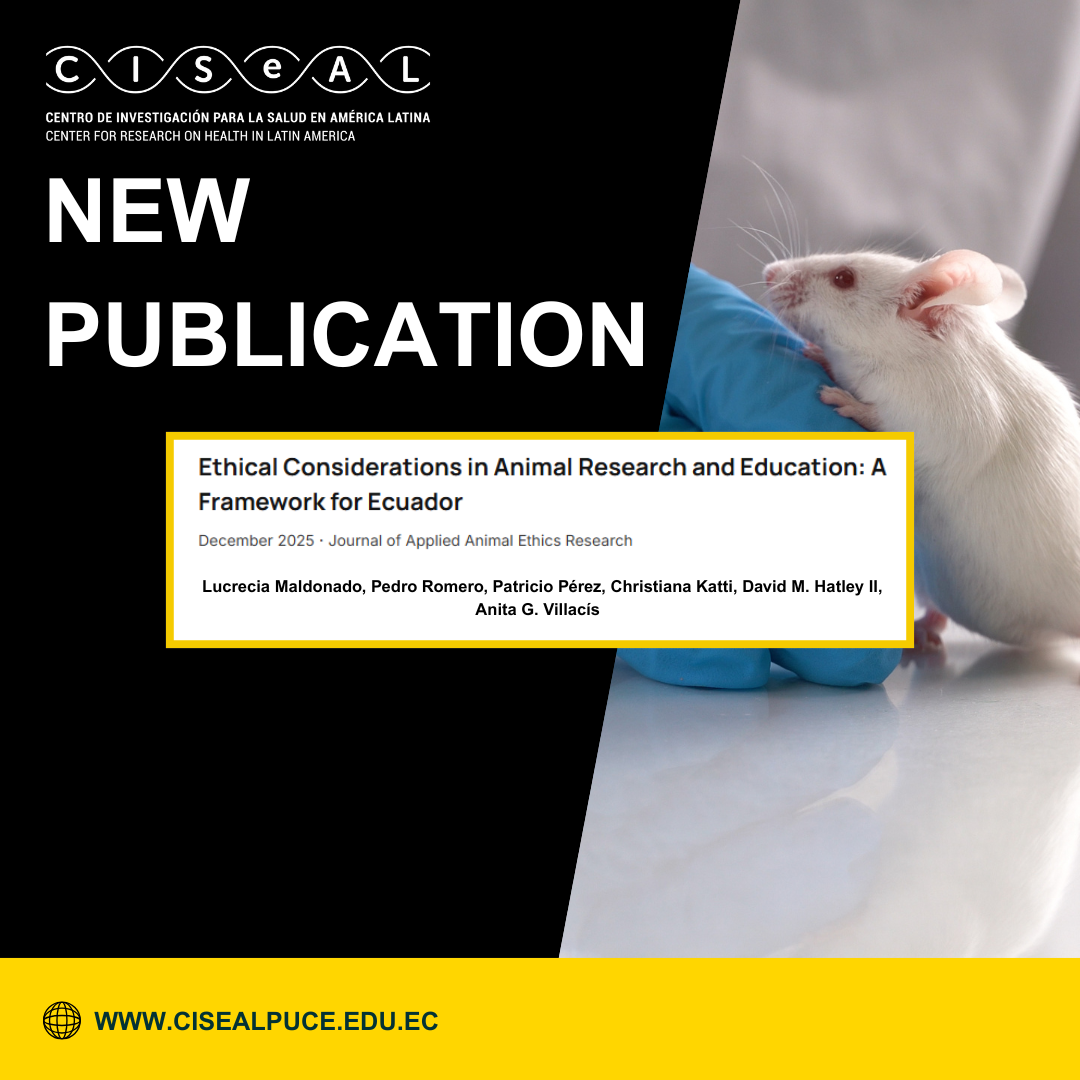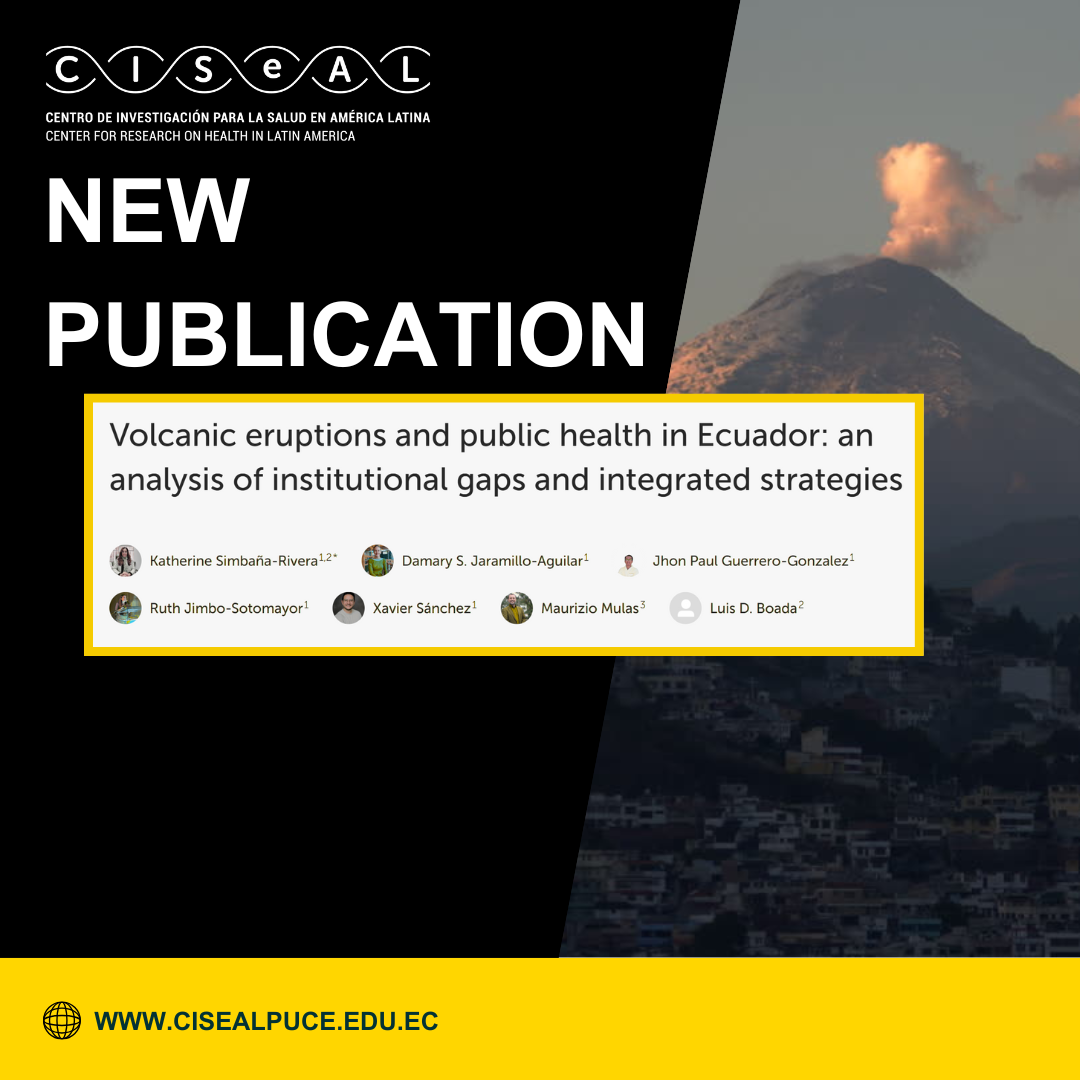 This study, led by Juan José Bustillos Herrera, adjunct researcher at CISeAL, comprehensively analyzed entomological and virological surveillance in areas with active dengue transmission in the province of Santo Domingo de los Tsáchilas, Ecuador, between June 2023 and September 2024, with the aim of assessing the epidemiological importance of Aedes aegypti and the recent presence of Aedes albopictus. Based on extensive sampling that included the inspection of more than 55,000 households and the collection of 3,918 mosquito specimens at both adult and immature stages, a clear predominance of Aedes aegypti was observed, accounting for more than 90% of the analyzed specimens, thus confirming its central role as the primary dengue vector in the area. Molecular analysis using RT-qPCR detected exclusively DENV-1 and DENV-2 serotypes in Aedes aegypti pools, with a positivity rate of 33.69%, while Aedes albopictus, although already established in the territory, showed no infection with any of the arboviruses screened. Entomological indices, particularly the Breteau Index, revealed high levels of infestation in several urban and rural parishes, identifying localities with high entomological risk, especially Chigüilpe, Río Verde, Río Toachi, Santo Domingo, and Zaracay.
This study, led by Juan José Bustillos Herrera, adjunct researcher at CISeAL, comprehensively analyzed entomological and virological surveillance in areas with active dengue transmission in the province of Santo Domingo de los Tsáchilas, Ecuador, between June 2023 and September 2024, with the aim of assessing the epidemiological importance of Aedes aegypti and the recent presence of Aedes albopictus. Based on extensive sampling that included the inspection of more than 55,000 households and the collection of 3,918 mosquito specimens at both adult and immature stages, a clear predominance of Aedes aegypti was observed, accounting for more than 90% of the analyzed specimens, thus confirming its central role as the primary dengue vector in the area. Molecular analysis using RT-qPCR detected exclusively DENV-1 and DENV-2 serotypes in Aedes aegypti pools, with a positivity rate of 33.69%, while Aedes albopictus, although already established in the territory, showed no infection with any of the arboviruses screened. Entomological indices, particularly the Breteau Index, revealed high levels of infestation in several urban and rural parishes, identifying localities with high entomological risk, especially Chigüilpe, Río Verde, Río Toachi, Santo Domingo, and Zaracay.
 The principal investigators Xavier Sánchez and Ruth Jimbo-Sotomayor, from CISeAL, together with a team affiliated with PUCE, conducted a study on the comorbidity of depression and anxiety in undergraduate and graduate medical students in Ecuador, focusing on estimating its prevalence and associated factors. The research, carried out between January and March 2025 with 700 participants, used validated psychiatric screening tools (PHQ-9 for depression, GAD-7 for anxiety, and AUDIT for alcohol use), defining comorbidity as clinically significant scores on both instruments. Results showed that 47.71% of students reported depression, 44.57% anxiety, and 36.71% depression-anxiety comorbidity, with higher prevalence among undergraduate students.
The principal investigators Xavier Sánchez and Ruth Jimbo-Sotomayor, from CISeAL, together with a team affiliated with PUCE, conducted a study on the comorbidity of depression and anxiety in undergraduate and graduate medical students in Ecuador, focusing on estimating its prevalence and associated factors. The research, carried out between January and March 2025 with 700 participants, used validated psychiatric screening tools (PHQ-9 for depression, GAD-7 for anxiety, and AUDIT for alcohol use), defining comorbidity as clinically significant scores on both instruments. Results showed that 47.71% of students reported depression, 44.57% anxiety, and 36.71% depression-anxiety comorbidity, with higher prevalence among undergraduate students.
 The CISeAL researchers Xavier Sánchez and Ruth Jimbo participated in a study that analyzed the relationship between health-promoting behaviors and the presence of depression, anxiety, and risky alcohol consumption among Ecuadorian medical residents, in a context characterized by high work demands, long working hours, and structural limitations in access to mental health services. Through a cross-sectional survey applied to 307 residents of the Pontifical Catholic University of Ecuador, validated instruments were used to assess depressive symptoms, anxiety, alcohol consumption, and health habits, along with sociodemographic and training variables. The results showed a high prevalence of depression (38.8%) and anxiety (33.9%), as well as 12.1% risky alcohol consumption, confirming a significant burden of mental health problems in this population. A strong correlation between depression and anxiety was observed, as well as a consistent inverse association between both and healthy behaviors, especially those related to a positive mental attitude, self-care practices, and nutrition.
The CISeAL researchers Xavier Sánchez and Ruth Jimbo participated in a study that analyzed the relationship between health-promoting behaviors and the presence of depression, anxiety, and risky alcohol consumption among Ecuadorian medical residents, in a context characterized by high work demands, long working hours, and structural limitations in access to mental health services. Through a cross-sectional survey applied to 307 residents of the Pontifical Catholic University of Ecuador, validated instruments were used to assess depressive symptoms, anxiety, alcohol consumption, and health habits, along with sociodemographic and training variables. The results showed a high prevalence of depression (38.8%) and anxiety (33.9%), as well as 12.1% risky alcohol consumption, confirming a significant burden of mental health problems in this population. A strong correlation between depression and anxiety was observed, as well as a consistent inverse association between both and healthy behaviors, especially those related to a positive mental attitude, self-care practices, and nutrition.



 The study in which our CISeAL researcher, Myrian Rivera, participated together with her laboratory technician, Mateo Salazar, analyzes the tuning of the photothermal properties of graphene oxide through doping with nitrogen and boron heteroatoms, with the aim of optimizing its application as an active agent in photothermal therapies for the elimination of cancer cells, integrating experimental assays and computational simulations based on density functional theory (DFT). In view of the limitations and side effects of conventional oncological treatments, photothermal therapy emerges as a minimally invasive alternative that enables the selective destruction of tumor cells through a controlled increase in temperature, using nanomaterials capable of converting light energy into heat. In this work, graphene oxide was synthesized and functionalized through hydrothermal processes to obtain nitrogen-doped (NGO) and boron-doped (BGO) materials, which were characterized at the morphological, structural, and chemical levels by electron microscopy and atomic force microscopy, as well as FTIR, Raman, and XPS spectroscopies, confirming monolayer structures, high crystallinity, and effective incorporation of the dopants into the graphene lattice.
The study in which our CISeAL researcher, Myrian Rivera, participated together with her laboratory technician, Mateo Salazar, analyzes the tuning of the photothermal properties of graphene oxide through doping with nitrogen and boron heteroatoms, with the aim of optimizing its application as an active agent in photothermal therapies for the elimination of cancer cells, integrating experimental assays and computational simulations based on density functional theory (DFT). In view of the limitations and side effects of conventional oncological treatments, photothermal therapy emerges as a minimally invasive alternative that enables the selective destruction of tumor cells through a controlled increase in temperature, using nanomaterials capable of converting light energy into heat. In this work, graphene oxide was synthesized and functionalized through hydrothermal processes to obtain nitrogen-doped (NGO) and boron-doped (BGO) materials, which were characterized at the morphological, structural, and chemical levels by electron microscopy and atomic force microscopy, as well as FTIR, Raman, and XPS spectroscopies, confirming monolayer structures, high crystallinity, and effective incorporation of the dopants into the graphene lattice. The present study, developed with the participation of Dr. Anita Villacís, critically analyzes the limited ethical oversight structures for animal research in Ecuador, within a context in which scientific productivity is high but institutional control mechanisms remain insufficient. In response to this issue, the research proposes a bioethical framework for the creation of an Animal Research Ethics Committee (CEIA) at the Pontificia Universidad Católica del Ecuador (PUCE), particularly oriented toward areas such as Biomedicine and related disciplines. The analysis is based on a qualitative review of policies and guidelines from 20 leading universities worldwide, selected through stratified sampling of the QS 2020 ranking in Life Sciences and Medicine, whose documents were coded and analyzed using Atlas.ti software. The results show that the principle of Refinement is the most developed internationally, followed by Reduction and, to a lesser extent, Replacement, reflecting a strong concern for minimizing animal suffering through proper handling, pain control, humane criteria, and comprehensive welfare.
The present study, developed with the participation of Dr. Anita Villacís, critically analyzes the limited ethical oversight structures for animal research in Ecuador, within a context in which scientific productivity is high but institutional control mechanisms remain insufficient. In response to this issue, the research proposes a bioethical framework for the creation of an Animal Research Ethics Committee (CEIA) at the Pontificia Universidad Católica del Ecuador (PUCE), particularly oriented toward areas such as Biomedicine and related disciplines. The analysis is based on a qualitative review of policies and guidelines from 20 leading universities worldwide, selected through stratified sampling of the QS 2020 ranking in Life Sciences and Medicine, whose documents were coded and analyzed using Atlas.ti software. The results show that the principle of Refinement is the most developed internationally, followed by Reduction and, to a lesser extent, Replacement, reflecting a strong concern for minimizing animal suffering through proper handling, pain control, humane criteria, and comprehensive welfare. This study, with the participation of the principal investigator of CISeAL, Dr. Fabián Sáenz, analyzes the presence of asymptomatic malaria infections in communities of the Putumayo canton in the Ecuadorian Amazon, a border area characterized by high human mobility and persistent transmission despite national advances in disease control. The research reveals a critical gap in epidemiological surveillance: while rapid diagnostic tests detected no cases and microscopy identified only high-density infections, the use of qPCR uncovered a hidden reservoir of asymptomatic malaria that remains invisible to routine methods. The results confirm a low but epidemiologically relevant prevalence, dominated by submicroscopic infections, consistent with the regional pattern of Plasmodium vivax predominance and with cross-border transmission dynamics sustained by river corridors and extractive activities.
This study, with the participation of the principal investigator of CISeAL, Dr. Fabián Sáenz, analyzes the presence of asymptomatic malaria infections in communities of the Putumayo canton in the Ecuadorian Amazon, a border area characterized by high human mobility and persistent transmission despite national advances in disease control. The research reveals a critical gap in epidemiological surveillance: while rapid diagnostic tests detected no cases and microscopy identified only high-density infections, the use of qPCR uncovered a hidden reservoir of asymptomatic malaria that remains invisible to routine methods. The results confirm a low but epidemiologically relevant prevalence, dominated by submicroscopic infections, consistent with the regional pattern of Plasmodium vivax predominance and with cross-border transmission dynamics sustained by river corridors and extractive activities. The article, led by Katherine Simbaña-Rivera and developed with the support of Damary S. Jaramillo-Aguilar, Ruth Jimbo-Sotomayor, Jhon Paul Guerrero-Gonzalez, and Xavier Sánchez, researchers from CISeAL, together with other experts, analyzes the preparedness and response of Ecuador’s health system to volcanic activity occurring between 2000 and 2024, in a country characterized by high exposure to this type of natural hazard. Based on an exhaustive documentary review of institutional, regulatory, scientific, and grey literature sources, the study examines the main eruptive events recorded at the Tungurahua, Cotopaxi, Sangay, and Reventador volcanoes, as well as the health impacts and the actions implemented by the institutions responsible for risk management and public health.
The article, led by Katherine Simbaña-Rivera and developed with the support of Damary S. Jaramillo-Aguilar, Ruth Jimbo-Sotomayor, Jhon Paul Guerrero-Gonzalez, and Xavier Sánchez, researchers from CISeAL, together with other experts, analyzes the preparedness and response of Ecuador’s health system to volcanic activity occurring between 2000 and 2024, in a country characterized by high exposure to this type of natural hazard. Based on an exhaustive documentary review of institutional, regulatory, scientific, and grey literature sources, the study examines the main eruptive events recorded at the Tungurahua, Cotopaxi, Sangay, and Reventador volcanoes, as well as the health impacts and the actions implemented by the institutions responsible for risk management and public health.